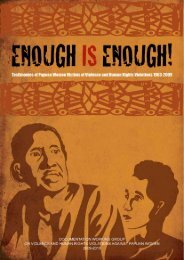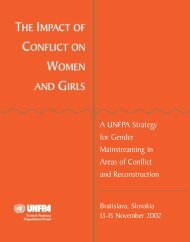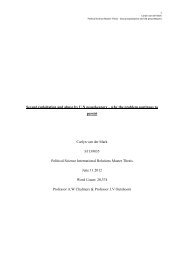Download the full report - Human Rights Watch
Download the full report - Human Rights Watch
Download the full report - Human Rights Watch
Create successful ePaper yourself
Turn your PDF publications into a flip-book with our unique Google optimized e-Paper software.
For instance, GD, a 31-year-old woman, told us that four men in civilian clo<strong>the</strong>s took her from<br />
her house in Dehiwala, Colombo, in late November 2011. She says <strong>the</strong> men introduced<br />
<strong>the</strong>mselves as CID officials and took her to <strong>the</strong> fourth floor of CID headquarters for questioning.<br />
There her interrogators, including a uniformed police officer, tortured and raped her.<br />
The Prevention of Terrorism Act (PTA) allows Sri Lankan authorities to hold detainees<br />
where <strong>the</strong>y choose and to move <strong>the</strong>m from place to place while under investigation, 68<br />
practices that increase <strong>the</strong> likelihood of torture and abuse. In only a handful of <strong>the</strong> cases<br />
<strong>report</strong>ed to <strong>Human</strong> <strong>Rights</strong> <strong>Watch</strong> was <strong>the</strong> victim provided an arrest warrant or a legally<br />
valid reason for arrest; more typically <strong>the</strong>y were forcibly put into vehicles and subjected to<br />
beatings. Some detainees told <strong>Human</strong> <strong>Rights</strong> <strong>Watch</strong> that rapes and sexual violence did not<br />
occur in <strong>the</strong> first and “known” places of detention, but ra<strong>the</strong>r after <strong>the</strong>y were driven, often<br />
blindfolded, to a second, unofficial location.<br />
None of <strong>the</strong> former detainees interviewed for this <strong>report</strong> were told that <strong>the</strong>y were being held<br />
under <strong>the</strong> Emergency Regulations or <strong>the</strong> Prevention of Terrorism Act (PTA). However, during<br />
interrogation, it became clear <strong>the</strong>y were detained due to <strong>the</strong>ir involvement or perceived<br />
association with <strong>the</strong> LTTE. For example, OP, 20, was arrested by <strong>the</strong> police during a random<br />
search operation at Colombo’s international airport in January 2009 because his ID card<br />
showed Puthukudiruppu—an LTTE stronghold <strong>the</strong>n under attack— as his home address. OP<br />
was initially taken to <strong>the</strong> sixth floor of TID headquarters in Colombo and transferred to a TID<br />
detention center at Boosa camp where he was interrogated and tortured. He <strong>report</strong>ed being<br />
repeatedly sexually abused during <strong>the</strong> five months he spent in Boosa.<br />
Interrogation Practices<br />
The interviews conducted by <strong>Human</strong> <strong>Rights</strong> <strong>Watch</strong> also reveal patterns in how<br />
interrogations were conducted and abuses meted out. Interrogations typically were<br />
conducted by teams, ra<strong>the</strong>r than by individuals, and members of <strong>the</strong> any given team often<br />
came from different government agencies. Torture, including sexual abuse, took place in<br />
interrogation rooms that appeared to be frequently used for torture, as <strong>the</strong>y were often<br />
68<br />
Prevention of Terrorism (Temporary Provisions) Act No. 48 of 1979, section 7(3): “A police officer conducting<br />
an investigation … shall have <strong>the</strong> right of access to [persons arrested under <strong>the</strong> act] and to take such person<br />
during reasonable hours to any place for <strong>the</strong> purpose of interrogation and from place to place for <strong>the</strong> purposes<br />
of investigation.”<br />
“WE WILL TEACH YOU A LESSON” 32




![IANSA [PDF, 2MB] - PeaceWomen](https://img.yumpu.com/25206379/1/190x123/iansa-pdf-2mb-peacewomen.jpg?quality=85)
![Commitments Sample [PDF, 93KB] - PeaceWomen](https://img.yumpu.com/25206331/1/190x245/commitments-sample-pdf-93kb-peacewomen.jpg?quality=85)










![A Toolkit for Advocacy and Action [PDF, 260KB] - Peace Women](https://img.yumpu.com/25205989/1/190x245/a-toolkit-for-advocacy-and-action-pdf-260kb-peace-women.jpg?quality=85)